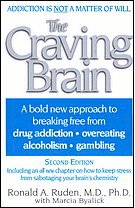The Craving Brain: A bold new approach to breaking free from *drug addiction *overeating *alcoholism *gambling

Note:
This is a book on the science of addiction. It includes a discussion of AA and Buddhism, Ruden is a clinician-scientist working in the field of medicine.
Chapter headings:
- 1. Survival
- 2. Landscaping the brain
- 3. The craving response
- 4. Battling for control
- 5. Biobalance
- 6. Biobalance to mindfitness
- 7. Curing sobriety
- 8. Response and responsibility
- The Scientific Foundation
- Postface etc
Selected excerpts:
“Craving is the force behind the drive to survive. It can produce an unstoppable involuntary behavioral response. Why are some of the approaches we’ve mentioned earlier sometimes successful in battling these powerful commands? Can we understand their success in terms of the biology of the brain? Will this understanding lead us to a new approach to treating addictive behavior?”
“As we said before, the earliest recorded method to stop craving was developed by Siddhartha, the founder of Buddhism. Siddhartha understood very well the impossible task of preventing pattern recognition from inflaming the passions. It is even possible that Siddhartha himself suffered from a craving brain. He tried the road of abstinence, he tried the road of excess, neither worked. What he ultimately found was that by following the Eightfold Path, he could avoid the conditioned responses of the brain that led to craving……”
“Buddha’s clever solution was not to fight the craving response once it occurred, but instead to prevent the pattern recognition process before it began. He explained that we had to fill our minds with the right thoughts, do the right things, and act the right way so that nothing that might possibly stimulate the brain’s craving response can enter the forefield or the backfield…”
“Buddha also understood that if a pattern recognition process was initiated, it was important for us to have the ability to empty our minds of everything. Here he suggests meditation, which results in a conditioned rise in serotonin and constraint of neural transmissions. The high serotonin level would prevent matches, leaving the mind empty. The pattern recognition process would be unable to lead to a craving response. As we mentioned previously, Buddha’s teaching, which prevents and extinguishes conditioned learning, made him the perfect example of an unconditioned man.” (pp. 89-91)
© 1997, 2000, 2003 Ronald A Ruden & Marcia Byalick
Order this book online at Amazon
Reviews posted:
Paul –
Ruden asserts that imbalances in the neurochemicals dopamine and serotonin create a craving landscape in the brain. He quotes research that indicates meditation can ‘biobalance the brain’ by raising serotonin levels. I was interested in this, because as a mild sufferer of OCD I have read that the disorder has been related to serotonin deficiency. Ruden’s guided tour of the research being conducted into addiction includes the science that demonstrates that addiction is not a matter of will (if there is anyone you know that needs convincing). In fact the cover and spine proudly proclaim ‘Addiction is not a matter of will’.
NB For those interested in Buddhist engagement with modern science I enthusiastically recommend the book Destructive Emotions, a dialogue with The Dalai Lama narrated by Daniel Goleman (Bloomsbury, 2004). It describes a week long conference that took place in March 2000 between the Dalai Lama and a panel of distinguished scientists and philosophers about human behaviour. This has led to a great deal of further research. Meditators may not need ‘proof’ of the benefits of meditation, but we live in a society dominated by science, and this sort of work can only serve to legitimise our practice. Buddhism, which is also about truth, has nothing to fear from science. Wasn’t Albert Einstein one of the tradition’s greatest admirers?
Michael –
This book looks at the scientific approach to addiction, examining the root cause of our addictive behaviour. Dr Ronald Ruden presents his concept of a unified theory behind addiction. The book is certainly somewhat interesting and presented in a remarkably clear manner for what is a largely a scientific approach. However, though scientists can theorize all they like about why I am an alcoholic, it does not change the simple fact that I am one. It is my sincere desire that such ongoing research may one day lead to better treatment and understanding of people with addiction, but for me at this point of time in my recovery I question its personal relevance. So I applaud his work, but I fail to see how any of this ultimately changes anything for me, a recovering alcoholic already living within a solution.
